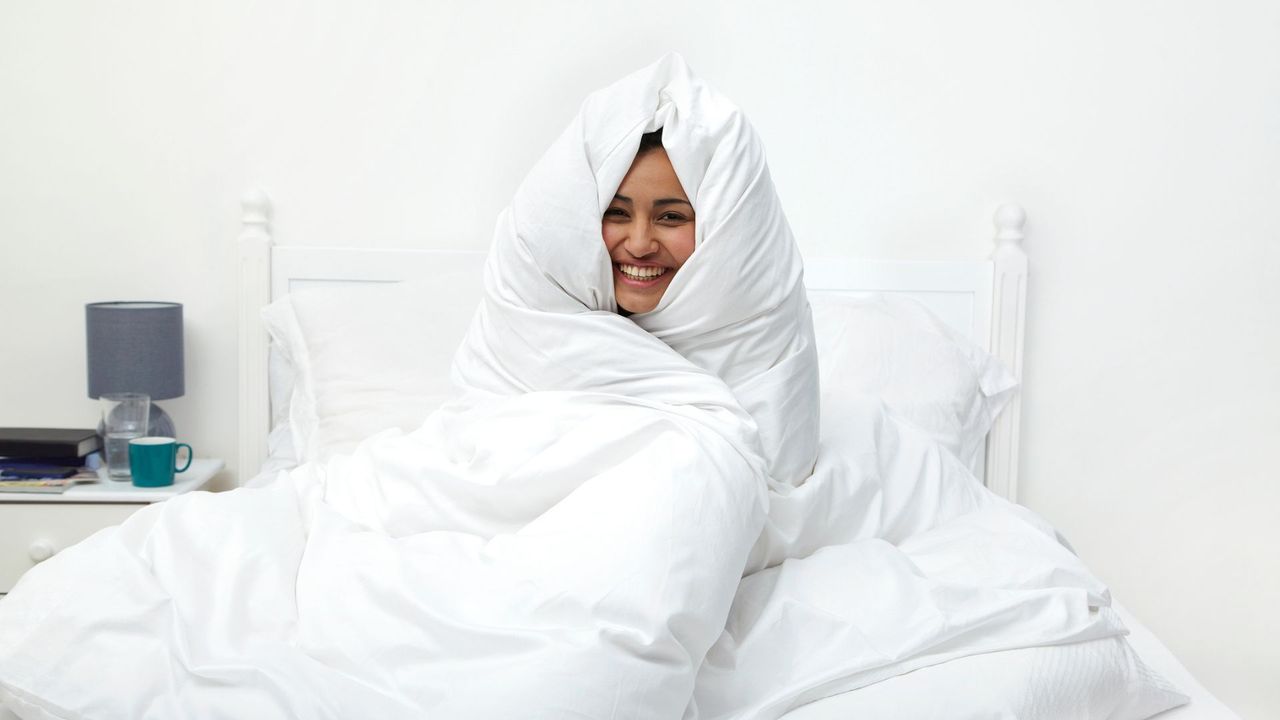Health
Experts Share 3 Proven Tips for Falling Asleep Quickly

The latest trend making waves on social media is the so-called ‘potato bed,’ a unique method of arranging bedding to foster comfort and relaxation. While the concept, which involves flipping a fitted sheet inside out and surrounding oneself with pillows and blankets, aims to create a cozy sleeping cocoon, experts advise caution regarding its effectiveness for quality sleep.
Dr. Deborah Lee, a health and sleep expert from Doctor Fox, expresses skepticism about the long-term benefits of this trend. She notes, “The potato bed trend may be okay for a one-off—perhaps for a sleepover—but to regularly sleep in this cocoon-like way can affect your sleep quality over time.”
According to Dr. Lee, while the arrangement may offer temporary comfort, it could restrict movement during sleep. This limitation can lead to discomfort and even pain, as it forces the body into a tight space. Moreover, the risk of overheating is heightened in such a confined setup, which disrupts the body’s ability to cool down—a critical factor for achieving restorative sleep.
### More Effective Sleep Strategies
Instead of experimenting with trends like the potato bed, experts recommend proven techniques to enhance sleep quality. Here are three effective strategies to help you fall asleep faster tonight.
One method is taking a warm bath or shower before bedtime. Dr. Leah Kaylor, a world sleep expert, explains that this practice can trigger a drop in core body temperature, signaling to the body that it is time to sleep. She emphasizes, “Moving from a hot bathroom to a cooler bedroom will cause your body temperature to drop.” This natural cue for sleep onset can significantly reduce the time it takes to fall asleep.
Another effective strategy is to minimize ambient noise and light in your sleeping environment. Dr. Kaylor suggests using sleep earplugs to block out disruptive sounds. Whether opting for disposable foam options or investing in reusable silicone models, these earplugs can greatly enhance your ability to drift off quickly. In addition, a blackout sleep mask can help eliminate light pollution, further fostering a conducive sleep atmosphere.
Lastly, cognitive shuffling is a technique that has gained traction among sleep enthusiasts. This method involves visualizing random objects, which can help quiet the mind. Dr. Kaylor recommends starting with a word like “SLEEP” and thinking of items that begin with each letter. For instance, for the letter “S,” one might visualize “sausage” or “sun.” Engaging in this mental exercise can help prevent intrusive thoughts and ease the transition to sleep.
These three strategies—taking a warm bath, reducing sensory distractions, and practicing cognitive shuffling—offer practical and effective alternatives to the potato bed trend. As we continue to search for the best ways to improve sleep, it is vital to focus on methods that genuinely enhance sleep quality rather than those that simply promise comfort.
-

 Lifestyle4 months ago
Lifestyle4 months agoLibraries Challenge Rising E-Book Costs Amid Growing Demand
-

 Sports4 months ago
Sports4 months agoTyreek Hill Responds to Tua Tagovailoa’s Comments on Team Dynamics
-

 Sports4 months ago
Sports4 months agoLiverpool Secures Agreement to Sign Young Striker Will Wright
-

 Lifestyle4 months ago
Lifestyle4 months agoSave Your Split Tomatoes: Expert Tips for Gardeners
-

 Lifestyle4 months ago
Lifestyle4 months agoPrincess Beatrice’s Daughter Athena Joins Siblings at London Parade
-

 World4 months ago
World4 months agoWinter Storms Lash New South Wales with Snow, Flood Risks
-

 Science4 months ago
Science4 months agoTrump Administration Moves to Repeal Key Climate Regulation
-

 Science3 months ago
Science3 months agoSan Francisco Hosts Unique Contest to Identify “Performative Males”
-

 Business4 months ago
Business4 months agoSoFi Technologies Shares Slip 2% Following Insider Stock Sale
-

 Science4 months ago
Science4 months agoNew Tool Reveals Link Between Horse Coat Condition and Parasites
-

 Sports4 months ago
Sports4 months agoElon Musk Sculpture Travels From Utah to Yosemite National Park
-

 Science4 months ago
Science4 months agoNew Study Confirms Humans Transported Stonehenge Bluestones









